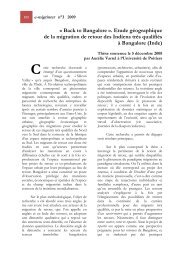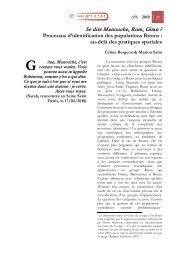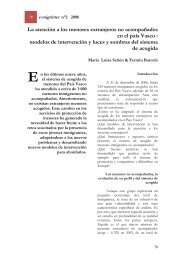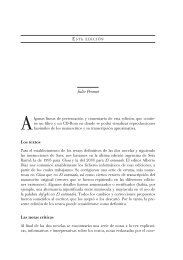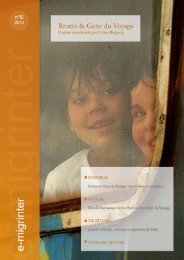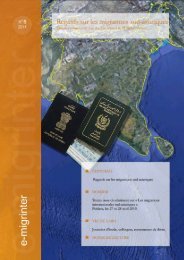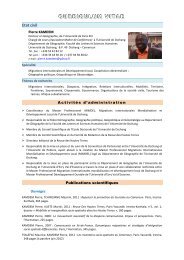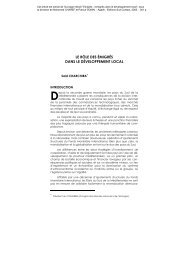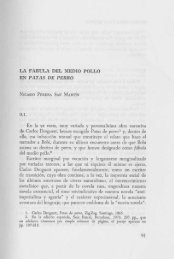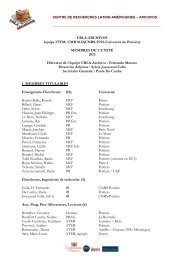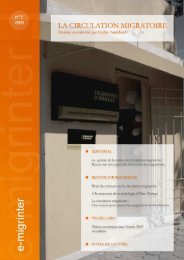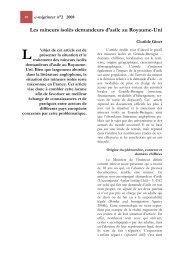e-migrinter 2010 numéro 05 - Maison des Sciences de l'Homme et ...
e-migrinter 2010 numéro 05 - Maison des Sciences de l'Homme et ...
e-migrinter 2010 numéro 05 - Maison des Sciences de l'Homme et ...
You also want an ePaper? Increase the reach of your titles
YUMPU automatically turns print PDFs into web optimized ePapers that Google loves.
42 n°5 <strong>2010</strong><br />
same age as she, feels otherwise. He is<br />
married to a woman from the Philippines<br />
whom he m<strong>et</strong> after his aunt arranged<br />
employment for him in Iceland. He pointed<br />
out in an interview that one of the main<br />
reasons why he is happy is that he has such a<br />
large kin group in Iceland. He sends<br />
remittances to his parents in the Philippines.<br />
They have visited him but found Iceland too<br />
cold and <strong><strong>de</strong>s</strong>olate to even consi<strong>de</strong>ring<br />
moving to live near him.<br />
The family life of the Filipinos living<br />
in Iceland transcends national bor<strong>de</strong>rs. They<br />
are connected, although to a different<br />
<strong>de</strong>gree, with relatives in the Philippines and<br />
in other countries. They assist their families<br />
by giving them part of the wages they earn<br />
in Iceland. They maintain daily contact<br />
through Skype and MSN, and this<br />
technology allows people to participate in<br />
the day-to-day activities of the family left<br />
behind. The intern<strong>et</strong> is used for other things<br />
as well (i.e. for watching television<br />
programs), but most people say that they use<br />
it primarily to stay in touch with relatives. A<br />
few people mentioned that they had even<br />
bought a computer for a relative in or<strong>de</strong>r to<br />
b<strong>et</strong>ter maintain communication. Some<br />
people are planning to or have already<br />
bought an apartment or a house in the<br />
Philippines for the money they have earned<br />
in Iceland. They commonly have some<br />
relative living in the houses they have<br />
invested in and part of the money is sent to<br />
pay for the upkeep of the property. Because<br />
of the long and expensive trip, people do<br />
not travel back and forth b<strong>et</strong>ween the two<br />
places often, but when they do travel there<br />
they stay for a longer period of time. It is<br />
important for them to see the family,<br />
especially to see sick parents or to attend<br />
weddings or funerals and to bring their<br />
children to me<strong>et</strong> relatives.<br />
The extent of transnational activity<br />
observed in my studies consists mostly of<br />
these kinds of traveling back and forth and<br />
keeping in touch with friends and relatives in<br />
what most people refer to as home country.<br />
Some people talk about belonging in<br />
different ways to both places, others say that<br />
they participate in one soci<strong>et</strong>y and belong to<br />
another. Places however, continue to be<br />
vital, both their former and current homes.<br />
The meanings of these places are<br />
nevertheless continuously negotiated in<br />
different contexts. Very few Filipinos in<br />
Iceland have plans to r<strong>et</strong>urn in the near<br />
future. About half of those born in the<br />
Philippines and living in Iceland have<br />
Icelandic citizenship (Statistics Iceland<br />
2009). Most of those who do not have<br />
Icelandic citizenship have not lived in<br />
Iceland for seven years, and do not y<strong>et</strong> have<br />
the right to apply for citizenship.<br />
It was very clear that having relatives<br />
from the Philippines living nearby was very<br />
important for the well-being of those who<br />
participated in my study. Spending time with<br />
relatives and seeking help from them is very<br />
important for the participants in the study.<br />
Many of them belong to a large kinship<br />
group in Iceland. They help each other with<br />
practical issues relating to housing and work,<br />
and they also heal each other with papers<br />
that have to be filled out and submitted.<br />
They socialize, eat Filipino food tog<strong>et</strong>her,<br />
exchange films, and sing karaoke. They also<br />
have large gatherings for special occasions<br />
like Christmas. When people compared the<br />
difference b<strong>et</strong>ween the two countries, they<br />
pointed out that family ties were much more<br />
important among Filipinos than Icelan<strong>de</strong>rs.<br />
The importance ascribed to helping each<br />
other out among grown up siblings, when<br />
the siblings are both living in Iceland as well<br />
as when the siblings live in separate<br />
countries, was commonly given as evi<strong>de</strong>nce<br />
of this. Helping is also exten<strong>de</strong>d to nieces<br />
and nephews. Thus some of the interviewees<br />
send money for the college education of<br />
their nieces or nephews and would like to<br />
help them move to Iceland or elsewhere<br />
where they can g<strong>et</strong> a good job. Many talked<br />
about feeling b<strong>et</strong>ter in Iceland because they<br />
had relatives living in Iceland as well. Some<br />
of those who, on the contrary, did not have<br />
relatives in Iceland talked about the lack of



